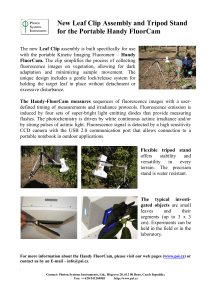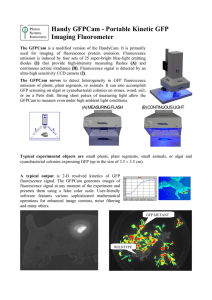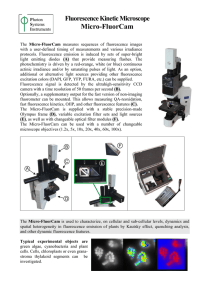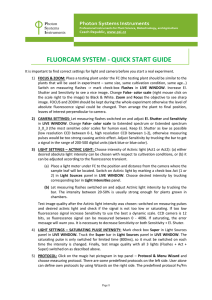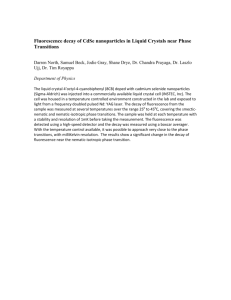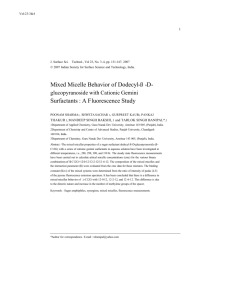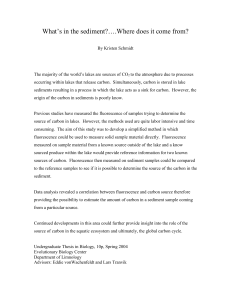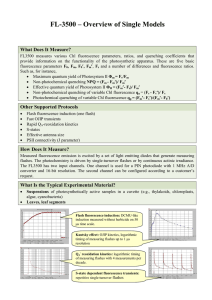Handy FluorCam Portable Kinetic Imaging Fluorometer
advertisement
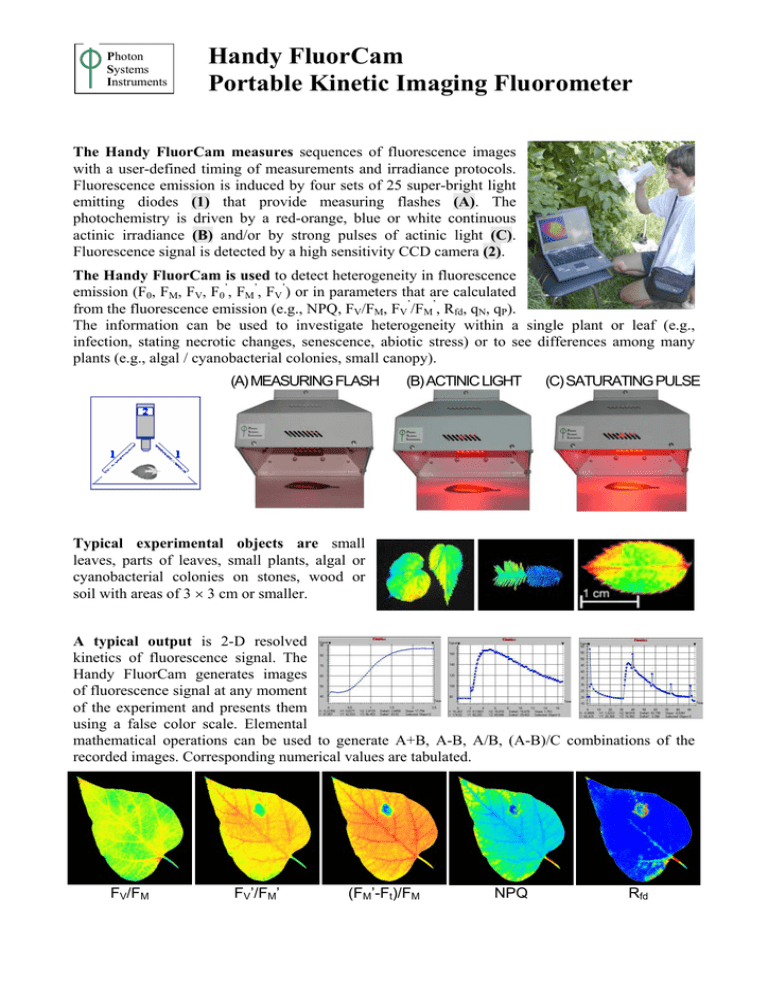
Photon Systems Instruments Handy FluorCam Portable Kinetic Imaging Fluorometer The Handy FluorCam measures sequences of fluorescence images with a user-defined timing of measurements and irradiance protocols. Fluorescence emission is induced by four sets of 25 super-bright light emitting diodes (1) that provide measuring flashes (A). The photochemistry is driven by a red-orange, blue or white continuous actinic irradiance (B) and/or by strong pulses of actinic light (C). Fluorescence signal is detected by a high sensitivity CCD camera (2). The Handy FluorCam is used to detect heterogeneity in fluorescence emission (F0, FM, FV, F0’, FM’, FV’) or in parameters that are calculated from the fluorescence emission (e.g., NPQ, FV/FM, FV’/FM’, Rfd, qN, qP). The information can be used to investigate heterogeneity within a single plant or leaf (e.g., infection, stating necrotic changes, senescence, abiotic stress) or to see differences among many plants (e.g., algal / cyanobacterial colonies, small canopy). (A) MEASURING FLASH (B) ACTINIC LIGHT (C) SATURATING PULSE Typical experimental objects are small leaves, parts of leaves, small plants, algal or cyanobacterial colonies on stones, wood or soil with areas of 3 × 3 cm or smaller. A typical output is 2-D resolved kinetics of fluorescence signal. The Handy FluorCam generates images of fluorescence signal at any moment of the experiment and presents them using a false color scale. Elemental mathematical operations can be used to generate A+B, A-B, A/B, (A-B)/C combinations of the recorded images. Corresponding numerical values are tabulated. FV/FM FV’/FM’ (FM’-Ft)/FM NPQ Rfd GENERAL DESCRIPTION The Handy FluorCam is a battery-powered, easily portable system that allows comfortable lab and field measurements. The Handy FluorCam is designed for kinetically resolved fluorescence imaging of leaves, parts of leaves, small plants, and algal or cyanobacterial colonies on stones, wood or soil with areas of 3 × 3 cm or smaller. In all applications, the camera allows measurement of two-dimensional resolved fluorescence transients induced by complex irradiance protocols. The fluorescence emission is induced by four sets of 25 super-bright orange, blue or white LEDs that provide excitation flashes of a user-definable duration or a continuous actinic irradiance. The same LEDs generate strong pulses of actinic light. The FluorCam software package includes a Wizard with the most frequently used experimental protocols. For an experienced professional, the instrument offers a sophisticated programming language that can be used to design novel timing and measuring sequences. TECHNICAL SPECIFICATION The Instrument consists of an ultra-high sensitivity CCD camera, objective, and sample chamber with four integrated panels of LEDs. The measuring unit is perfectly suited for field experiments for its size is only 21.5 × 13.5 × 13.5 cm. Battery pack: The Handy FluorCam operates from external NiMH batteries. The device is supplied with a battery recharger and a small power supply for lab experiments. Both the batteries and the power supply fit into a convenient bag. The CCD camera is equipped with a F1/1.4 objective with zoom. It captures 512 × 512 pixel images of 12-bit (or 14bit) grey scale with a maximum frequency of 50 frames per second. The images are recorded synchronously with measuring light flashes. Data transmission is facilitated via a USB 2.0 port. Light Sources: Measuring flashes, continuous actinic light and saturating flashes are generated in four light panels, each containing 25 orange LEDs (λmax = 620 nm). Optionally, different LED colors can be installed. Measuring flash duration is 10 µs - 33 µs. Continuous actinic light is adjustable in duration and power (up to 660 µmol photons m-2 s-1). Saturating flashes are also adjustable in duration (up to 2 sec.) and power (up to 2,000 µmol photons m-2 s-1). Software: The instrument is controlled by the FluorCam software that is Windows 2000/XP or higher compatible. The software enables: • Designing and/or to modifying experimental protocols, i.e., the user can control timing, duration, and intensity of the light sources as well as the camera operation. • Performing intelligent image segmentation and displaying fluorescence kinetics of the selected image segments. • Subtracting background signals and averaging the images to improve the signal to noise ratio. • Combining images taken in the different phases of transients by the use of arithmetic operations, such as, subtraction, addition, or division. FV, FV/FM, qP, qN, NPQ, Rfd, and other fluorescence parameters can be calculated to generate a table of calculated numeric characteristics for each of the selected objects (FV, FV/FM, qP, qN, NPQ, etc.). • Generating tables from the calculated numeric characteristics for each of the selected objects. Computing: A high-end computer with the USB 2.0 interface and the FluorCam software are included. PSI (Photon Systems Instruments), Ltd., Högrova 20, 612 00 Brno, Czech Republic Fax: ++420 541269005 http://www.psi.cz
